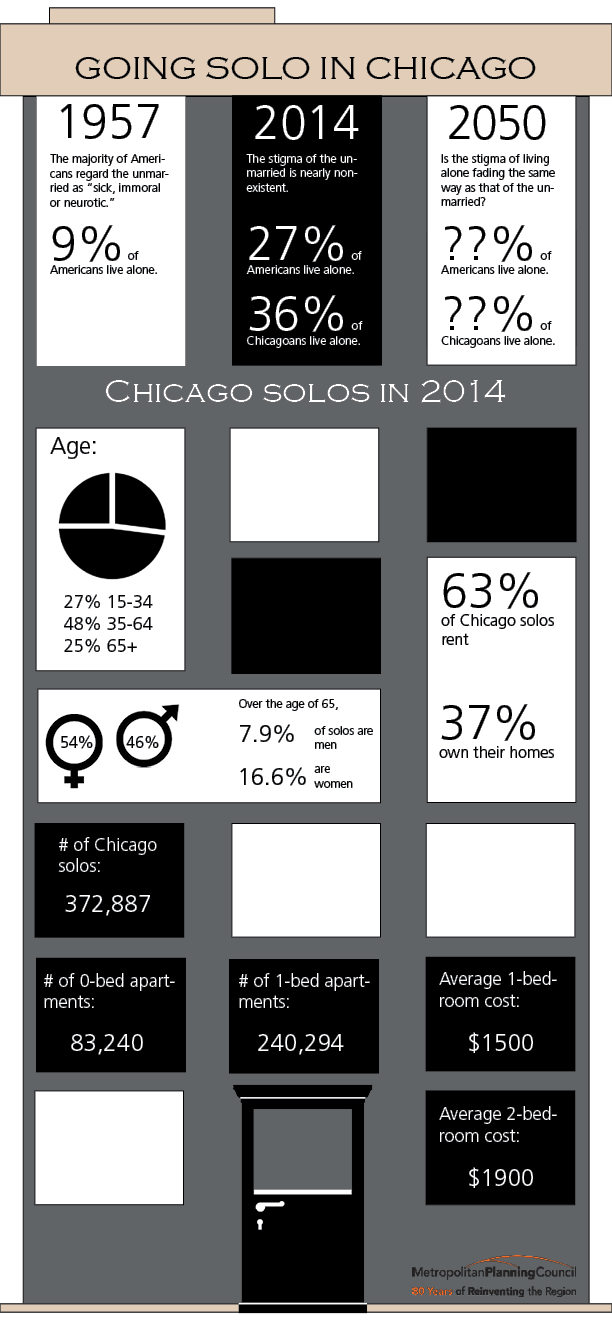
MPC
More and more people in the U.S. are living alone, which can have ramifications for municipal governments and planners.
“Interdependence makes our independence possible.” So we learned from Eric Klinenberg, author of the 2012 book Going Solo, at MPC’s most recent Urban Think & Drink on Tuesday, May 20. The event, sponsored by Wight & Co, a design and construction firm, drew a crowd of more than 50 people and featured an intriguing talk by Klinenberg about the dramatic increase in people living alone over the past five decades. What are the implications of this emerging trend on individuals as well as our urban environments? As a sociologist and urban thinker, Klinenberg provides a foundation on which to explore this question.
MPC has decided to explore how this social phenomenon ties in with our Homes for a Changing Region work in a two-part blog series that will:
- Look at how this trend has emerged in Chicago and the region in terms of who is living alone in our region and why, and
- Identify the environmental conditions that best support the solo lifestyle from a housing and community perspective, and
In his book, Klinenberg references a 1957 survey of Americans in which more than half of the participants regarded the unmarried as “sick, immoral, or neurotic.” By the 1970s, the negative opinion of the unmarried was still present, but reduced. And today, Klinenberg argues that the stigma of being unmarried is nearly nonexistent. Based on current trends, it is likely that the stigma of living alone—often thought of as lonely and isolated—is fading in the same way as negative opinions of the unmarried:

Data source: U.S. Census
As is obvious from the number of solos in Chicago versus the number of studio and one-bedroom apartments, living alone isn't an economical choice. So, why are so many people "going solo?"
Klinenberg’s book identifies various breeds of solos through extensive research and interviews. For example, in the younger age group (15 to 34 year-olds), there are people seeking independence for the first time, and finding it with their own space for which they are solely responsible. Or, younger solos could be influenced by their childhood. Today many Americans grow up always having their own room with their own toys—why start sharing now? Latchkey kids who constantly came home to an empty house due to working parents are familiar—and possibly most comfortable—with the solo lifestyle. As for the middle (35 to 64 years) and oldest (65+ years) age groups, the reasons for living alone are endless. For some, it has always been their way of life either by choice or not—for personal or career reasons. Others are divorcees, widows or widowers, empty nesters, those involved in crime or addiction or those recovering and retreating from certain situations.
Understanding this current trend to live alone and identifying the demands it creates can better inform efforts such as Homes for a Changing Region, a product of MPC’s partnership with Chicago Metropolitan Agency for Planning and Metropolitan Mayors Caucus. Homes strives to develop long-term housing policy plans based on supply and demand projections determined by current demographic trends. Homes also explores policies and practices that are needed to support aging in place. As we see more people choosing to live the solo life, it will become necessary to find ways to make the solo lifestyle healthy, safe and sustainable while aging and ensure that the housing stock can accommodate demand.
Personal circumstances drive people to pursue the solo life. But, what does that life look like and how “alone” are solos? In the next installment of this blog series, we will explore the lifestyle of Chicago solos and determine what kind of impacts living alone has on their personal lives and how this evolving population is impacting our city.